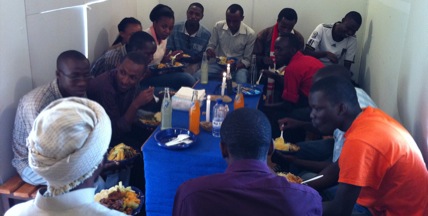|
About the Workshops
Concerning the idea of perpetual peace, Jeremy Bentham once wrote that "it is not only thought to be hopeless, but to such a degree that any proposal to that effect deserves the name of visionary and ridiculous." And yet, Bentham adds, "What better education [...] than the proposal itself?" Taking Bentham's provocation seriously, in these workshops we read selected passages from Immanuel Kant's writings on Perpetual Peace, in order to confront a number of related questions concerning ideas such as peace, hospitality, and reconciliation, for which there is no single answer or solution.
The workshop recording featured here took place in the Department of Architecture at the Kigali Institute of Science and Technology. The workshop and its recording do not succeed in providing a full definition or an ideal discussion; rather, the conversation enacts another space for discussing the concept of perpetual peace within the institutional and cultural setting of the Kigali Institute of Science and Technology.
The multiple perspectives heard in this recording emerged over the course of a series of related workshops and within the space of an associated exhibition. In presenting these voices online, our intention is not to give a coherent definition for Rwandan culture or the Kinyarwanda language, but rather to make visible--to the participants, to others, and ourselves--the process of defining and translating peace itself. Eventually, this conversation must include everyone, since no one can claim to have absolute knowledge concerning the idea of peace.
Acknowledgements
The Perpetual Peace Project at the Department of Architecture, Kigali Institute of Science and Technology (KIST), is organized by Slought Foundation, in partnership with Syracuse University Humanities Center and with support from Musagetes Foundation. Presented in partnership with the
International Peace Institute (IPI), the European Union National Institutes of Culture (EUNIC), and United Nations University (UNU). Special thanks to Yutaka Sho and Nerea Amorós Elorduy at the Kigali Institute of Science and Technology (KIST), and Mimi Cheng, Curatorial and Research Fellow, and Megan Velong, Curatorial Assistant, at Slought Foundation.
The recording featured on this webpage is from a seminar conducted with students in the Department of Architecture at the Kigali Institute of Science and Technology (KIST) on July 27, 2011. The workshop was part of a series of activities, all collaboratively organized by Aaron Levy, Executive Director of Slought Foundation, and Yutaka Sho, Professor at KIST, that took place from July 22-August 2, 2011.
Click here for information about other workshops
|
|
Listen to the Recordings
Multimedia Content Blocked
Workshop at KIST, Rwanda
(38 min)
Or watch videos from the workshops
Selected Quotations
- "You begin to forgive those who have done bad things to you... You feel like you love everyone, that's how you can show them peace. They will feel free with you, and in peace with you."
- "Peace is when I am not at war with myself."
- "Peace is something that switches off and on -- happiness, freedom, and all the human rights."
- "If you have the chance to increase your income without facing many obstacles, and if you are sleeping and engaging in your studies without interference from things like rebellion, then you can say that you are independent and in peace."
- "Peace begins with independence and collaboration, it starts from one person, and how they understand themselves, and spreads to the community, the country, and then to diplomacy."
- "Peace can start in the family, when the man and the woman love each other, and the children can also grow up and have peace."
- "Peace is not consistent, it is not constant, and it has no minimum."
- "Peace is sustainable stability."
|

